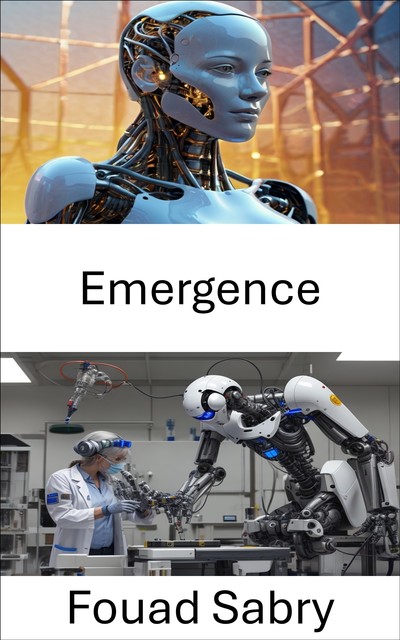Мы используем файлы куки, чтобы Bookmate и наши рекомендации работали лучше.
Подробнее на странице Политика Cookies
Подробнее на странице Политика Cookies
Принять все Cookies
Выбрать cookies
Что-то пошло не так. Попробуйте ещё раз.
“Emergence” is a groundbreaking exploration into the intricate world of complex systems, where small elements combine to form unpredictable and dynamic patterns. This book offers deep insights into how emergent phenomena arise across various fields, from physics to social systems, and how these principles intersect with the cuttingedge world of Robotics Science. Whether you're a professional in the field, an undergraduate or graduate student, or simply a curious enthusiast, this book offers valuable knowledge that connects theory with practical applications. The information within is invaluable for anyone looking to understand the complexity of natural and artificial systems alike.
Chapters Brief Overview:
1: Emergence: An introduction to the concept of emergence, illustrating how simple systems create complex behaviors.
2: Condensed matter physics: Examines the role of condensed matter in understanding emergent behaviors in physical systems.
3: Complexity: Discusses the nature of complexity and its implications for scientific research and robotic systems.
4: Quantum mechanics: Explores how quantum mechanics can help explain emergent phenomena at microscopic levels.
5: Statistical mechanics: Introduces statistical methods that underpin emergent behavior in large systems and robotics.
6: Complex system: A deep dive into complex systems, where many components interact to create unpredictable outcomes.
7: Reductionism: Analyzes how reducing complex systems to their basic components often misses emergent properties.
8: Holism: Explores the holistic view, which suggests that systems must be understood as a whole to fully grasp emergent phenomena.
9: Selforganization: Investigates how systems can organize themselves without external control, critical to robotic autonomy.
10: Social simulation: Discusses how emergent behaviors can be modeled in social systems, relevant for multirobot cooperation.
11: Selforganized criticality: Delivers insights into systems that naturally evolve to critical states, impacting robotics in unpredictable ways.
12: Emergentism: Provides a comprehensive view of emergentism, stressing its importance in understanding natural and artificial systems.
13: Social complexity: Explores the social systems' complexity and its parallels to robotic systems and collective intelligence.
14: Computational sociology: Introduces computational methods for studying social dynamics and their applicability in robotics.
15: Dynamical systems theory: Focuses on the role of dynamical systems theory in modeling robotic systems' behavior.
16: Generative science: Investigates how generative science principles apply to the creation of autonomous robotic systems.
17: Complex adaptive system: Examines how adaptive systems in both nature and robotics respond to environmental changes.
18: Computer simulation and organizational studies: Discusses using computer simulations to study organizational behavior, relevant to robotic teams.
19: Universal Darwinism: Explores the theory of universal Darwinism and how it can inform evolutionary robotics and AI development.
20: Particle: Investigates particlebased approaches to modeling robotic behavior, with a focus on swarm intelligence.
21: Artificial life: Concludes with an exploration of artificial life and its growing significance in the development of autonomous robotic systems.
“Emergence” provides the essential framework for understanding the complex and interconnected world of robotics and beyond. Its comprehensive approach to emergent phenomena is indispensable for anyone striving to advance in the fields of robotics, complexity science, and artificial intelligence.
Chapters Brief Overview:
1: Emergence: An introduction to the concept of emergence, illustrating how simple systems create complex behaviors.
2: Condensed matter physics: Examines the role of condensed matter in understanding emergent behaviors in physical systems.
3: Complexity: Discusses the nature of complexity and its implications for scientific research and robotic systems.
4: Quantum mechanics: Explores how quantum mechanics can help explain emergent phenomena at microscopic levels.
5: Statistical mechanics: Introduces statistical methods that underpin emergent behavior in large systems and robotics.
6: Complex system: A deep dive into complex systems, where many components interact to create unpredictable outcomes.
7: Reductionism: Analyzes how reducing complex systems to their basic components often misses emergent properties.
8: Holism: Explores the holistic view, which suggests that systems must be understood as a whole to fully grasp emergent phenomena.
9: Selforganization: Investigates how systems can organize themselves without external control, critical to robotic autonomy.
10: Social simulation: Discusses how emergent behaviors can be modeled in social systems, relevant for multirobot cooperation.
11: Selforganized criticality: Delivers insights into systems that naturally evolve to critical states, impacting robotics in unpredictable ways.
12: Emergentism: Provides a comprehensive view of emergentism, stressing its importance in understanding natural and artificial systems.
13: Social complexity: Explores the social systems' complexity and its parallels to robotic systems and collective intelligence.
14: Computational sociology: Introduces computational methods for studying social dynamics and their applicability in robotics.
15: Dynamical systems theory: Focuses on the role of dynamical systems theory in modeling robotic systems' behavior.
16: Generative science: Investigates how generative science principles apply to the creation of autonomous robotic systems.
17: Complex adaptive system: Examines how adaptive systems in both nature and robotics respond to environmental changes.
18: Computer simulation and organizational studies: Discusses using computer simulations to study organizational behavior, relevant to robotic teams.
19: Universal Darwinism: Explores the theory of universal Darwinism and how it can inform evolutionary robotics and AI development.
20: Particle: Investigates particlebased approaches to modeling robotic behavior, with a focus on swarm intelligence.
21: Artificial life: Concludes with an exploration of artificial life and its growing significance in the development of autonomous robotic systems.
“Emergence” provides the essential framework for understanding the complex and interconnected world of robotics and beyond. Its comprehensive approach to emergent phenomena is indispensable for anyone striving to advance in the fields of robotics, complexity science, and artificial intelligence.
больше
308 бумажных страниц
- Дата публикации оригинала
- 2025
- Год выхода издания
- 2025
- Издательство
- One Billion Knowledgeable
Уже прочитали? Что скажете?
👍👎
fb2epub
Перетащите файлы сюда,
не более 5 за один раз


